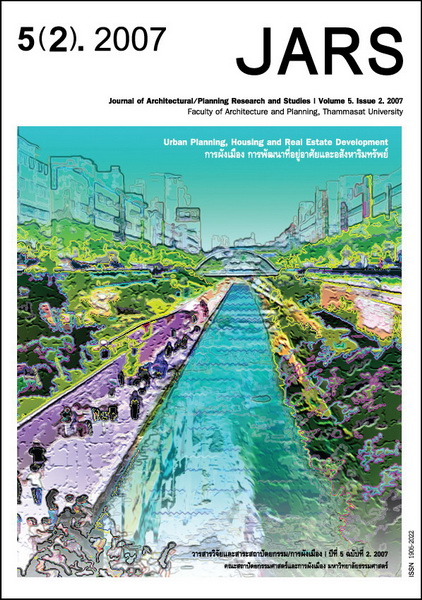The Influence of Consciousness Evolution on the Transformation toward Sustainable Real Estate Development
Main Article Content
Abstract
The development under the egocentric paradigm has contributed to so many global-crises, in both spiritual and physical dimensions, that the “sustainable development” paradigm had to be announced as a basis of any future resolutions. Such announcement has stimulated lots of results supporting sustainable development in various aspects. However, most of those results have failed to emphasize consciousness evolution although international experts in every area have consented the consciousness evolution is crucial for the time being as sustainable development concepts are so limited, especially in real estate sector. So, this study aims at revealing the influence of consciousness evolution on the quality of real estate development by employing Buddha-Dharma and Integral Theory, developed under integral paradigm, in exploring the transformation towards sustainable real estate development through urban-communities internationally. The findings indicate that the transformation toward integral sustainability occurred, and that the consciousness evolution is the primary factor enabling this occurrence. Therefore, the conclusion reiterates the emergence of sustainable real estate depends on development of all life-dimensions, not just development of social systems such as economics, regulations, and technologies. It is especially crucial to note that only with maturity of consciousness lifted above ego, could human see the holistic realm of the phenomenon, including the advantages and disadvantage of every sciences and everyone. This seeing, in return, would enable human to integrate all advantages in a balance manner, resulting in appropriate approaches to take the world out of the crises, toward balance and sustainability.
Downloads
Article Details

This work is licensed under a Creative Commons Attribution-NonCommercial-NoDerivatives 4.0 International License.
All material is licensed under the terms of the Creative Commons Attribution 4.0 International (CC-BY-NC-ND 4.0) License, unless otherwise stated. As such, authors are free to share, copy, and redistribute the material in any medium or format. The authors must give appropriate credit, provide a link to the license, and indicate if changes were made. The authors may do so in any reasonable manner, but not in any way that suggests the licensor endorses you or your use. The authors may not use the material for commercial purposes. If the authors remix, transform, or build upon the material, they may not distribute the modified material, unless permission is obtained from JARS. Final, accepted versions of the paper may be posted on third party repositories, provided appropriate acknowledgement to the original source is clearly noted.
References
คาปร้า ฟริตจ๊อฟ. (2544). จุดเปลี่ยนแห่งศตวรรษ. แปลจาก The turning point โดย พระประชา ปสน.นธ.มโม, พระไพศาลวิสาโล, สันติสุข โสภณสิริ และรสนา โตสิตระกูล. กรุงเทพฯ: โกมลคีมทอง.
สุวินัย ภรณวลัย. (2547). การเมืองเชิงบูรณาการ. กรุงเทพฯ: โอเพ่น บุ๊คส์.
สมชัย สัจจพงษ์. (2547). ทะลุมิติเศรษฐกิจการคลังไทย. สืบค้นเมื่อ 17 ตลาคม ุ 2549, จาก http://www.geocities.com/saintgabriel3c/doc.doc
แปซิฟิค อินเตอร์เน็ต (ประเทศไทย). (2549). Smart solutions for smart SMES. สืบค้นเมื่อ 17 ตุลาคม 2549, จาก http:// www.thhardwarezone.com/newsDetail.asp?topicID=0000504
วิมลสิทธิ์ หรยางกูร และคณะ. (2544). สถานภาพผลงานทางวิชาการสาขาสถาปัตยกรรมในประเทศไทย. กรุงเทพฯ: สำนักงานคณะกรรมการวิจัยแห่งชาติ.
กลุ่มจิตวิวัฒน์. (2548). จิตผลิบาน. กรุงเทพฯ: อมรินทร์พริ้นติ้งแอนด์พับลิซซิ่ง.
สำนักงานคณะกรรมการพัฒนาระบบราชการ. ผู้ว่าราชการจังหวัดบูรณาการ (CEO) คือใคร?. สืบค้นเมื่อ 19 ตุลาคม 2550, จาก http:// www.pea.co.th/pean2/itt.files/frame.htm#slide0008.htm
ธวัชชัย เพ็งพินิจ. (2547). แผนที่ชีวิต การจัดการเพื่อเข้าถึงคน. สืบค้นเมื่อ 27 มีนาคม 2550, จาก http://www. nesac.go.th/kms/opinion_board/view.ph.?topic=14
Beck, D. (2001). Sustainable cultures, sustainable planet: A values system perspective on constructive dialogue and cooperative action. Paper presented at the Leaps and Bounds: The Road to Sustainable Development in a National and International Perspective Conference, Leeuwarden, the Netherlands.
Buddhadasa, B. (1990). Conserving the inner ecology. Retrieved June 5, 2003, from http:// www.suanmokkh.org/archive/ecology1.htm
พุทธทาสภิกขุ. (2545). อิทัปปัจจยาตา (ฉบับย่นความ). กรุงเทพฯ: สุขภาพใจ.
คุยกับชัยวัฒน์. (2543, 17 พฤษภาคม). กรุงเทพธุรกิจ. สืบค้นเมื่อ 19 ตลาคม ุ 2550, จาก http://www.pantip.com/cafe/wahkor/article/chaiwat/cwt_bkkbz118.html
Wilber, K. (2006). What is integral?. Retrieved June 1, 2006, from http:// www.integralnaked.org
Wilber, K. (2000). A brief history of everything (2nd ed.). Boston: Shambhala.
Beck, D. E., & Cowan, C. C. (2001). Spiral dynamics (9th ed.). Malden, MA: Blackwell.
Beck, D. E. Don Beck on spiral dynamics and AQAL. Retrieved July 13, 2007, from http://www.integralpotions.blogspot.com/2007/07/don-beck-on-spiral-dynamics-and-aqal.html
Beck, D. E. An integral perspective to shape productivity. Retrieved July 1, 2006, from http:// www.spring.gov.sg/newsarchive/epublications/pd/2001_11/index1.html
Jackson, H., & Svensson, K. (Eds.). (2002). Ecovillage living: Restoring the earth and her mother.Devon, UK: Green Books.
คุณธรรม สันติธรรม. (2549). แนวทางการปรับปรุงผังบริเวณและการจัดการสู่มหาวิทยาลัยเขียวสะอาด: มหาวิทยาลัยธรรมศาสตร์ ศูนย์รังสิต. วารสารวิจัยและสาระสถาปัตยกรรม/การผังเมือง, 4(2), 155-185.
ธนภณ พันธเสน. (2547). บูรณาการผสานศาสตร์ทางอสังหาริมทรัพย์. รายงานการประชุมวิชาการและวิชาชีพสถาปัตยกรรม ครั้งที่ 1, 136-143.


